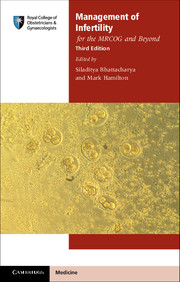Book contents
- Frontmatter
- Contents
- About the authors
- Preface
- Acknowledgements
- Abbreviations
- 1 Epidemiology and initial assessment
- 2 Male factor infertility
- 3 Ovulatory disorders
- 4 Tubal infertility
- 5 Endometriosis-related infertility
- 6 Uterine factors in infertility
- 7 Unexplained infertility
- 8 Assisted reproduction – preparation and work-up of couples
- 9 Assisted reproduction – clinical and laboratory procedures
- Index
Preface
Published online by Cambridge University Press: 05 June 2014
- Frontmatter
- Contents
- About the authors
- Preface
- Acknowledgements
- Abbreviations
- 1 Epidemiology and initial assessment
- 2 Male factor infertility
- 3 Ovulatory disorders
- 4 Tubal infertility
- 5 Endometriosis-related infertility
- 6 Uterine factors in infertility
- 7 Unexplained infertility
- 8 Assisted reproduction – preparation and work-up of couples
- 9 Assisted reproduction – clinical and laboratory procedures
- Index
Summary
Infertility affects up to one in six couples and remains a major cause of distress in both men and women. Concerns about fertility continue to grow across the world along with economic and social pressures causing women to delay childbirth, and the impact of lifestyle factors such as obesity, smoking and alcohol intake.
The last two decades have witnessed a shift towards evidence-based fertility treatment and greater awareness of the need to ensure the highest standards of safety. Management of infertility has moved away from an aetiological pathway where physicians identify and then treat an underlying pathology, to a prognostic approach where the decision to initiate treatment is driven by awareness of a couple's chances of spontaneous conception and what can be achieved with intervention.
To address the changes in the way fertility problems are now diagnosed, investigated and managed, we have substantially redesigned the third edition of this book, enlisting a new cast of authors and expanding the scope of the text. While the evidence base underpinning the choice of tests and treatments is sometimes far from secure, clinical decisions should be made jointly with patients and should maximise health gains while minimising costs and risks.
Infertility remains an integral part of core training for those taking the MRCOG examination. We hope that this book will provide a concise guide to fertility practice for trainees as well as for specialists.
- Type
- Chapter
- Information
- Publisher: Cambridge University PressPrint publication year: 2014

